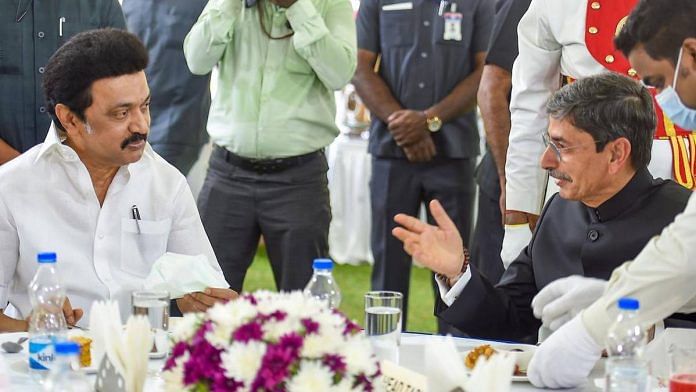New Delhi: The Tamil Nadu government has knocked on the doors of the apex court with a petition against Governor R.N. Ravi, alleging that his inaction in clearing crucial bills passed by the legislature has caused a “constitutional deadlock” in the state.
In a writ petition filed Saturday, which ThePrint has accessed, the state said the governor had positioned himself as a “political rival” by not assenting to legislation, policies, orders, and other files forwarded for his consideration.
The state government has also alleged that Ravi has acted unconstitutionally, illegally, and arbitrarily by refusing to sanction the prosecution and investigation of former ministers and public servants in corruption cases. It has also raised questions over the pending appointment of members of the Tamil Nadu Public Service Commission.
The rift between the two in Tamil Nadu comes amid growing tensions between state governments and governors in other states as well, including Punjab and West Bengal. Punjab, too, has filed a petition on similar lines before the top court.
Tamil Nadu has contended that the governor has no discretion to act against the state government’s advice except in specified exceptional circumstances, and that he is bound to act on the advice in a time-bound manner.
Earlier this year, the Supreme Court had reiterated the need for state governors to return files “as soon as possible” to give effect to the language of the Constitution, insisting that governors must not sit on bills forwarded for assent.
The court was then hearing the Telangana government’s petition arising out of a similar stalemate over proposed bills pending before the state governor for the latter’s approval.
In the background of these rifts, ThePrint explains the role of a governor — the Centre’s nominee as constitutional head of a state — in India and the legal position in accordance with the Constitution and court judgments delivered in the past.
Power & functions of governors
The Constitution empowers a governor to perform various important functions, such as the appointment of ministers and functionaries, and assenting to legislation. However, according to the Constitution, such powers are to be exercised with the aid and advice of the council of ministers.
When a bill is presented to the governor, according to Article 200 of the Constitution, he/she has four options — assent to the bill, withhold assent, reserve the bill for consideration of the President, or return the bill for reconsideration of the state legislature.
If a bill is returned to the legislature and then submitted again to the governor for assent, it is mandatory for the governor to assent the second time.
The last two options do not set a rigid time limit for the governor’s decision — only that such decision must be taken as soon as possible, which has been interpreted by courts to mean as being without avoidable delay.
There is no election to the post of governor, the appointment being the Centre’s sole prerogative.
Also Read: How rising Centre-state friction is chipping away at Modi’s ‘cooperative federalism’ mantra
‘Bound by state govt’
In a celebrated 1974 judgment (Shamsher Singh & Anr vs State of Punjab) on the constitutional role of the governor, the apex court had said that the governor was a formal or ceremonial head, and was bound to act on the aid and advice of the council of ministers, which is the elected state government.
The SC had then said that the governor was not intended to be a “parallel administration” and could not refuse to exercise his/her powers of appointment, finance or assent that are constitutionally mandated.
Multiple other court verdicts since then have said that a dominant role cannot be ascribed to the governor and that he or she is bound by the decisions of the state government.
The Centre had in 2007 set up an expert commission headed by former Chief Justice of India M.M. Punchhi to examine the Centre-state relationship. The panel’s findings echoed the earlier court views that the governor does not exercise any discretion of his own.
“Article 163 does not give the governor a general discretionary power to act against or without the advice of his council of ministers,” the panel’s report had then said.
“In fact, the area for the exercise of discretion is limited and even in this limited area, his choice of action should not be nor appear to be arbitrary or fanciful,” it added.
In the petition filed by Telangana, the state had alleged that unlike other states where assent was given quickly, because Telangana was ruled by an “opposition party”, assent was taking so much time.
While the state government had contended that Governor Tamilisai Soundararajan was sitting on bills, she had said she was considering them.
However, soon after the top court’s nudge, Soundararajan cleared three bills awaiting her assent, referred two to the President and reserved two for “active consideration”.
(Edited by Nida Fatima Siddiqui)
Also Read: Karnataka’s Vala continues notorious tradition of governors taking risks with the courts



